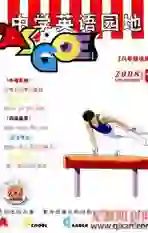新目标英语八年级(上)疑难解析(Unit8)
2008-11-26王对成
王对成
1. —Were there any sharks? 里面有鲨鱼吗?
—No, there werent any sharks, but there were some really clever seals. (P47) 没有,但里面有些确实聪明的海貂。
【难点释疑】 这里用的是“there be”句型。这种句型表示“某地(或某时)有某人(或某物)”,其形式为“there be + 代词或名词(短语) + 地点/时间状语”。这里there是引导词,没有词义, be是谓语动词, be后面的代词或名词(短语)是主语。 be的形式要和与其邻近的主语在人称和数上保持一致。 be后面加not可构成否定形式;将be放在there前面可构成一般疑问句; “be(或其否定式) + there”可构成附加句中的简短问句。例如:
There were eight thousand students in our school last year. 去年我们学校有8,000名学生。
There are 60 minutes in an hour. 一小时有60分钟。
There is some meat on the plate. 碟子里有些肉。
There will be an English evening next Tuesday. 下周二有一个英语晚会。
【知识拓展】 在使用“there be”句型时,要记住:如果作主语用的名词是可数名词的复数形式,其前可用“any, some, few, a few, many”或“数词 + hundred/thousand/million, hundreds/thousands/millions of, no”等修饰;若主语是不可数名词则可用“any, some, no, little, a little, much”等词修饰。例如:
There is much water here. You neednt get some more. 这儿有很多水了,你不需要再去取了。
There is no food at home. You have to buy some at once. 家里没有吃的了,你得赶快去买一些。
2. —Did you go to the zoo? 你去动物园了吗?
—No, I went to the aquarium. (P47) 没有,我去了水族馆。
【难点释疑】 这是以实义动词作谓语的一般过去时的一般疑问句和陈述句。在英语中,表示过去发生的动作或存在的状态时,谓语动词要用“一般过去时”。例如:
My mother was here five minutes ago. 我母亲五分钟前在这儿。
There were a lot of trees in front of our classroom before the earthquake. 地震前我们教室前有许多树。
We had a good time in the park yesterday. 昨天我们在公园里玩得很开心。
They worked here in 2002. 他们2002年在这儿工作。
3. Class 9 had a great time on the school trip. (P49) 9班的同学在学校组织的旅游活动中玩得很开心。
【难点释疑】 句中的have是实义动词,不是助动词。如果把本句变为否定句,应改为: Class 9 didnt have a great time on the school trip. 改为一般疑问句时,应为: Did Class 9 have a great time on the school trip? 再如:
We had a meeting yesterday. 昨天我们开了一个会。
Did you have a meeting yesterday? 昨天你们开会了吗?
We did not have a meeting yesterday. 昨天我们没有开会。
4. Finally, tired but happy, they took the bus back to school. (P49) 最后,他们非常疲惫但开心地乘车返回了学校。
【难点释疑】 句中的形容词tired but happy用作状语。再如:
Sad and tired, she slept the whole day. 又难过又疲惫,她睡了整整一天。
Young, rich and pretty, Rose has a lot of boy friends. 露丝年轻、富裕又漂亮,所以她有很多男朋友。
Large or small, all countries are equal. 国家无论大小,都是平等的。
【知识拓展】 ① 形容词除了用作状语外,还常用作补语、表语、定语等。例如:
I think youd better not marry young. 我认为你最好不要早婚。
He came home sick. 他带病回了家。
Her voice is very sweet. 她的嗓音很甜美。
② 形容词修饰something, nothing, anything, everything等不定代词时要后置。例如:
I have to speak to the man loudly because theres something wrong with his ears. 我不得不大声对这个人讲话,因为他的耳朵有毛病。
5. That sounds interesting. What did you see? (P49) 那听起来很有趣。你看到些什么了?
【难点释疑】 ① sound在句中用作系动词,后面要跟形容词作表语。例如:
The music sounds sweet. 这音乐听起来真悦耳。
The idea sounds nice. 这主意听起来不错。
② “What did you see?”是以实义动词作谓语的特殊疑问句, did在句中用作助动词,没有任何意义。再如:
Where did you go last week. 上周你到哪里去了?
What did they do a moment ago? 刚才你做了什么?
【知识拓展】 常见的系动词有以下几种:
① 状态系动词be用来表示主语所处的状态或身份。例如:
He is a teacher. We are students. 他是一名教师。我们是学生。
② 表像系动词,用来表示“看起来像”这一意义,主要有seem, appear, look等。例如:
He looks tired. 他看起来很累。
She seems (to be) very sad. 她看起来很伤心。
③ 感官系动词,这种系动词主要有feel, smell, sound, taste等。例如:
This kind of cloth feels very soft. 这种布摸起来很软。
This flower smells very sweet. 这朵花闻起来很香。
④ 持续系动词,用来表示主语继续或保持一种状况或态度,这种系动词主要有keep, remain, stay, lie, stand等。例如:
He always kept silent at meeting. 他开会时总是保持沉默。
⑤ 变化系动词,这些系动词表示主语变成什么样,它们主要有become, grow, turn, fall, get, go, come, run等。例如:
He became mad after that. 自那之后,他疯了。
6. On my next day off, I dont want to go for a drive. (P50) 我下一个假期,不想去开车了。
【难点释疑】 本句中的to go for a drive用作宾语。 decide, hope, agree, choose, fail, wish, learn, refuse, pretend等动词后只能跟动词不定式作宾语而不能跟动名词。例如:
He agreed to get someone to help us. 他同意找人来帮我们的忙。
Mr White is on the phone, wishing to speak to you. 怀特先生来电话,要跟你讲话。
They decided to leave here the next week. 他们决定下周离开这里。
【知识拓展】 值得注意的是:动词know后面不能直接跟动词不定式或动名词作其宾语,而要跟“连接代词/连接副词 + 动词不定式”构成的短语作宾语。例如:
I really dont know what to do next. 我真地不知道下一步该怎么办。
Do you know where to find him? 你知道在哪儿能找到他吗?
Im sorry, I really dont know how to mend the clock. 很抱歉,我真地不知道如何修理钟表。
7. Luckily, we brought our umbrellas and raincoats, so we didnt get wet. (P51) 幸运的是,我们带了雨伞和雨衣,所以我们没有淋湿。
【难点释疑】 本句中的谓语动词用的也是一般过去时。句中的get用作系动词,后面可接形容词、过去分词、现在分词等作表语。例如:
It gets warmer and warmer. 天气变得越来越暖和。
The boy got hurt on his way home from school. 放学回家的路上那个男孩受了伤。
get用作使役动词时,常接形容词、过去分词、现在分词和不定式作宾语补足语。例如:
Dont get your room dirty. 别把你的屋子搞脏了。
Ill get her to help you with your maths. 我将叫她帮你学数学。
Can you get the clock going again? 你能让这钟走起来吗?
She got her leg broken while playing basketball. 她打篮球时把腿摔断了。
